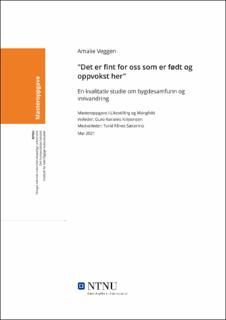| dc.description.abstract | Sammendrag
I denne masteroppgaven undersøker jeg hvilke forståelser lokalbefolkningen i en liten bygd i Midt-Norge har av innvandring til stedet de bor. Det empiriske grunnlaget i oppgaven er tre individuelle dybdeintervjuer og tre parintervjuer, med to personer i hvert intervju. Datamaterialet fra disse seks samtalene presenteres gjennom tre analysekapitler, der jeg bruker tematisk analyse som analysegrep.
Det første analysekapitlet tar for seg temaer knyttet til hvordan lokalbefolkningen snakker om «de andre» på, som i dette tilfellet er innvandrere. Instanser som migrasjonsårsak, språk og sosiale relasjoner viste seg å være viktige for informantene gjennom samtalene, og kan knyttes til hva lokalbefolkningen anser som «vellykket» integrering. I tillegg hadde informantene en forståelse om at det er mulig for innvandrerne å bli en av «oss», betinget av instanser som godt språk, like interesser og felles erfaringer.
I det andre analysekapitlet undersøker jeg hvordan lokalbefolkningen i bygda betrakter seg selv i møte med andre. I forskningsmaterialet nevner informantene gjentatte ganger hvordan både de selv og andre lokale i bygda, forholder seg til nykommere til bygda. I forrige analysekapittel snakket informantene om innvandrere, men i dette kapitlet betyr nykommere både personer med innvandrerbakgrunn og personer av etnisk norsk opprinnelse. Funnene viste blant annet lokalbefolkningens selvforståelse av hvordan de opptrer i møte med nye innbyggere i bygda, hvordan ansvaret med å skaffe sosiale relasjoner lå på tilflytterne selv og hvordan lokalbefolkningen legitimerer denne måten å ta til seg nykommere på.
I det siste analysekapitlet viser jeg hvilke effekter innvandring har hatt på bygda, i lys av et bredere mangfold og matkultur. Resultatene viste at lokalbefolkningen var innforstått med at innvandrerne i bygda har kommet for å bli, som har ført til at yngre generasjoner betrakter innvandrere med et annet blikk enn hva den eldre generasjonen gjør. I tillegg viste funnene at innvandrere var velkomne ettersom de har bragt med seg ulik matkultur, som har blitt godt tatt imot av den øvrige lokalbefolkningen. | |
| dc.description.abstract | Abstract
In this master's thesis, I investigate the understandings of the local population in a small settlement in Central Norway to immigration in the place where they live. The empirical basis of the thesis is three individual in-depth interviews and three pair interviews, with two people in each interview. The data material from these six conversations are presented through three analysis chapters, where I use thematic analysis as an analysis concept.
The first analysis chapter deals with topics related to how the local population talks about "the others", who in this case are immigrants. Bodies such as the cause of migration, language and social relations proved to be important for the informants through the conversations and can be linked to what the local population considers to be "successful" integration. In addition, the informants had an understanding that it is possible for immigrants to become one of "us", conditioned by substances such as good language, equal interests, and common experiences.
In the second analysis chapter, I examine how the locals in the village talk about themselves when they talk about others. In the research material, the informants repeatedly mention how both themselves and other locals in the village behave in meetings with others. In the previous analysis chapter, the informants talked about immigrants, but in this chapter, newcomers mean both people with an immigrant background and people of ethnic Norwegian origin. The findings showed, among other things, how the local population's self-understanding of how they behave towards new inhabitants in the village, how the responsibility for providing social relations lay with the newcomers themselves and how the local population legitimizes this way to absorb newcomers.
In the last analysis chapter, I show the effects that immigration has had on the village, in regards of attitude changes and food culture. The results showed that the local population agreed that the immigrants in the village have come to stay, which among other things, has led to younger generations viewing immigrants with a different perspective than what the older generation does. In addition, the findings showed that immigrants were welcome as they have brought with them different food cultures, which have been well received by the rest of the local population. | |
